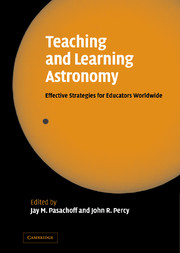Book contents
- Frontmatter
- Contents
- List of illustrations
- Preface
- Introduction
- Part I Astronomy in the curriculum around the world
- Introduction
- 1 Why astronomy is useful and should be included in the school curriculum
- 2 Astronomy and mathematics education
- Open discussion
- 3 Engaging gifted science students through astronomy
- Poster highlights
- Part II Astronomy education research
- Part III Educating students
- Part IV Educating teachers
- Part V Astronomy and pseudoscience
- Part VI Astronomy and culture
- Part VII Astronomy in developing countries
- Part VIII Public outreach in astronomy
- Part IX The education programs of the International Astronomical Union
- Part X Conclusions
- Author index
- Subject index
Open discussion
Published online by Cambridge University Press: 18 May 2010
- Frontmatter
- Contents
- List of illustrations
- Preface
- Introduction
- Part I Astronomy in the curriculum around the world
- Introduction
- 1 Why astronomy is useful and should be included in the school curriculum
- 2 Astronomy and mathematics education
- Open discussion
- 3 Engaging gifted science students through astronomy
- Poster highlights
- Part II Astronomy education research
- Part III Educating students
- Part IV Educating teachers
- Part V Astronomy and pseudoscience
- Part VI Astronomy and culture
- Part VII Astronomy in developing countries
- Part VIII Public outreach in astronomy
- Part IX The education programs of the International Astronomical Union
- Part X Conclusions
- Author index
- Subject index
Summary
David McKinnon: Astronomy is an ideal integrative field. We alienate teachers enough by treating it as a “subject,” one in which they feel that they have no “expertise.” This is especially the case in primary schools where the teachers “teach” all of the “subjects” in the primary curriculum. Integration can happen by employing a thematic approach to the “teaching” of astronomy, which is driven by the students' interest.
Carlson R. Chambliss: I teach astronomy in a small university in Pennsylvania that has a planetarium. Pennsylvania is an unusual case due to the presence of Spitz Laboratories, the leading manufacturer of planetariums in the state. There are far more planetariums in Pennsylvanian secondary schools and colleges than anywhere else in the USA or elsewhere. High school planetarium directors usually do K–12 (6–17 year-olds) planetarium sessions.
Jayant Narlikar: By and large, astronomy in Indian schools is introduced as an appendage to geography. It hardly does justice to the scope of the subject or to the curiosity of the student. My experience with the numerous postcards I receive from secondary school students is that they have read a lot on the descriptive aspects of astronomy but would like to know the “why” behind them. As such I feel that O and A level physics will be a suitable stage when the “astrophysics” part could be introduced to the students.
- Type
- Chapter
- Information
- Teaching and Learning AstronomyEffective Strategies for Educators Worldwide, pp. 25 - 26Publisher: Cambridge University PressPrint publication year: 2005



